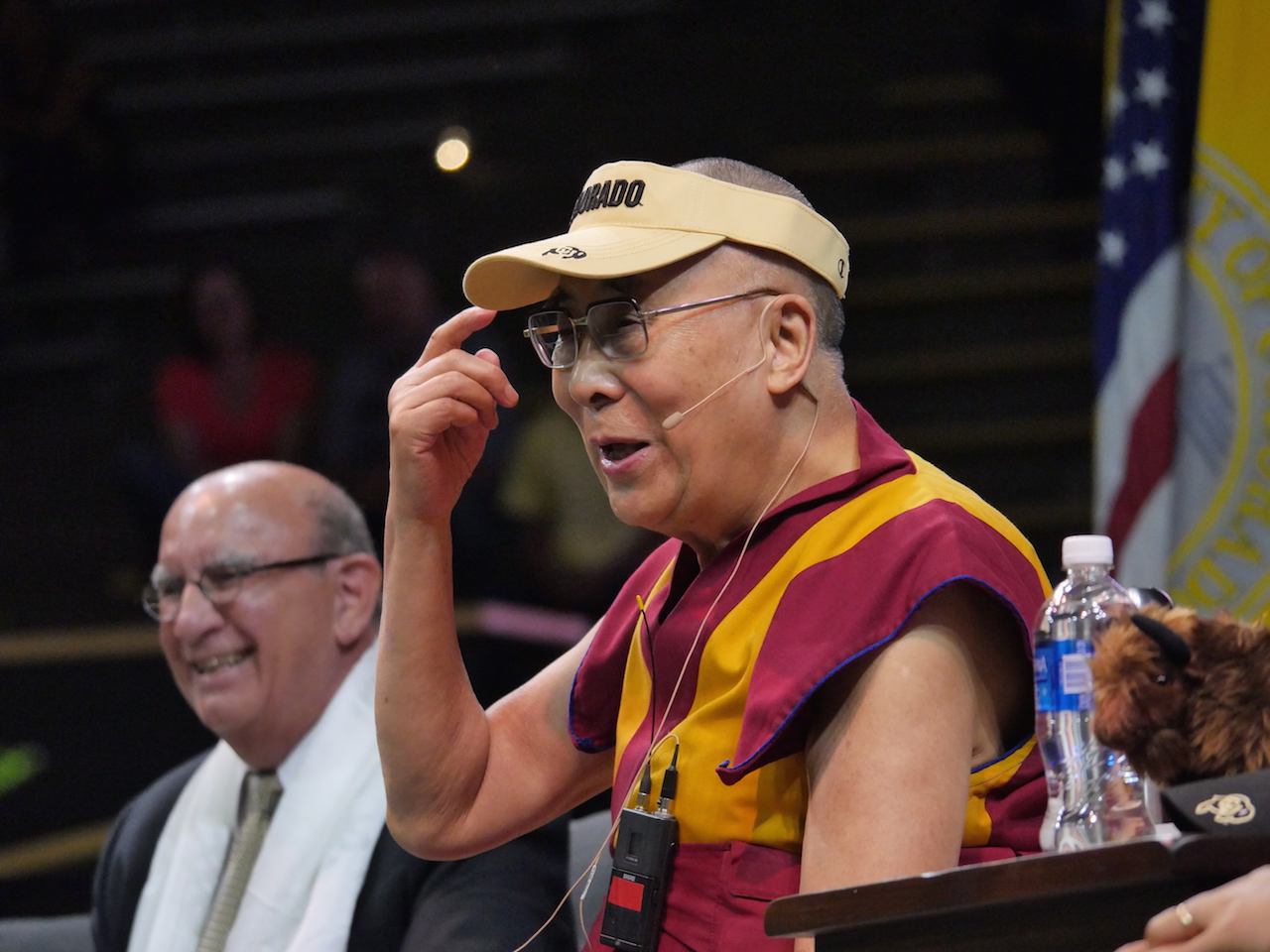The Local newsletter is your free, daily guide to life in Colorado. For locals, by locals.
“We are all the same human beings—mentally, physically, and emotionally,” says the Dalai Lama, beginning the first of two sold-out appearances at the University of Colorado Boulder’s Coors Events Center. For someone who carries the title His Holiness, it might seem an interesting place to start, but not if you’re familiar with the 14th Dalai Lama and his major tenets.
The 80-year-old monk was born Tenzin Gyatso on a straw mat in rural Tibet. In Tibetan Buddhist culture, which believes in reincarnation, there exists a select subset of enlightened individuals who are said to be able to control the time and place of their future births. The Dalai Lamas are the most famous example and are believed to be manifestations of the Bodhisattva of Compassion, continually eschewing nirvana in order to serve humanity—Gyatso was discovered at the age of two, after an extensive process that included consulting an oracle and interpreting numerous signs.

For non-Buddhists, the Dalai Lama still serves as a spiritual leader, touting a message of secular ethics, peace, non-violence, inter-religious harmony, and the preservation of Tibetan culture. He touched on all those themes during his two talks: “Eight Verses for Training the Mind” (which was heady and focused on Buddhist dharma) and “Educating the Heart and the Mind” (where the Dalai Lama answered audience questions). Throughout, he spoke with a sense of humor, approachability, and humility seldom associated with world leaders.
Colorado has about 300 Tibetans living in exile and that community’s children kicked off the day’s events with traditional costumes, dancing, and song. After introductions from Congressman Jared Polis (who earned a standing ovation after announcing he was returning to D.C. for the sit in) and Boulder Mayor Suzanne Jones (who fittingly gifted the Dalai Lama a bike helmet and jersey), the Dalai Lama began speaking with an accent, occasionally using a translator to ruminate on everything from globalization and materialism to analytical thinking and forgiveness.
When the talks concluded, the audience—old Tibetan women, folks in Burning Man garb, college students—were left with a lot to digest. Here are our takeaways.

A New Reality
“Reality has changed, but our thinking is old and dated: In order to gain you destroy the other,” says the Dalai Lama. “The new reality: the destruction of your neighbor is the destruction of yourself.” In a globalized world, he continued, things like climate change and the global economy have no national boundaries, and we’re in for “the same miserable century,” filled with starvation, poverty, and death, unless we ignite change.
Change Begins With One
Small transformations have a butterfly effect—as one individual becomes more compassionate she spreads it to a friend and then more friends, until gradually thousands have been drawn into the fold.
A More Compassionate Humanity
“We need to make an effort through education so that we can achieve a happier, more compassionate world,” says the Dalai Lama, calling on politicians, the media, and educational institutions to lead the charge. Again and again, the Dalai Lama stressed the importance of cultivating tolerance, contentment, and forgiveness in order to practice altruism. “If we think one goal—a happier, more compassionate world—then I think it’s possible the second half of the century will be a happier world.”
Take the High Road
“Our enemies are our greatest teachers,” says the Dalai Lama, expounding on the need to always practice humility in dealing with others and be aware of our own afflictions in order to counter them. When others are negative, be tolerant and patient, remaining unperturbed.
Mind Your Materialism
Inner beauty trumps outer beauty. Technology used only for temporary entertainment is a waste of time. We need to move away from an emphasis on materialism in our lives and culture.
Our Only Hope is Education
“Our only hope is through education—to change our thinking and our way and life,” says the Dalai Lama, emphasizing the importance of dialectical thought, as well as the use of both the head and the heart. “We need teaching and education in the existing secular education field which covers the entirety of humanity.” Maybe then, in three or four decades, our children will be born into a better world.








